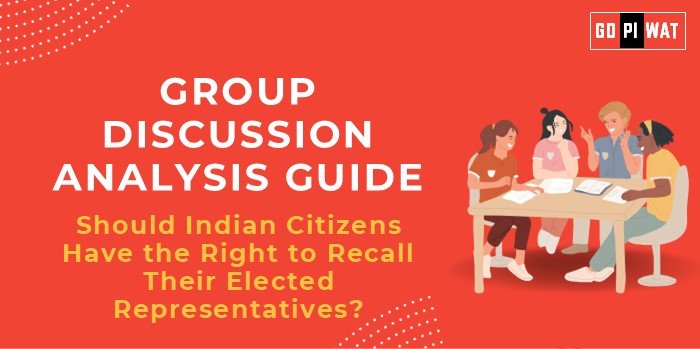📋 Group Discussion Analysis Guide: Should Indian Citizens Have the Right to Recall Their Elected Representatives?
🌐 Introduction to the Topic
- 📖 Opening Context: The right to recall elected representatives is a mechanism that allows voters to remove public officials before the end of their term. Globally, it is seen as a tool to enhance accountability in governance, and its implementation in India could mark a significant shift in its democratic framework.
- 🌍 Topic Background: The concept originated from direct democracy practices, notably in Switzerland and the United States. In India, the idea has been sporadically discussed but remains limited to some local governance frameworks, such as in Madhya Pradesh and Chhattisgarh for panchayat leaders.
📊 Quick Facts and Key Statistics
- 🌏 Direct Democracy Examples: Countries like Switzerland and the US allow recall votes at various governance levels.
- 🇮🇳 Indian Scenario: Madhya Pradesh and Chhattisgarh have panchayat-level recall provisions.
- 📈 Electoral Trust Deficit: According to a 2023 Lokniti-CSDS survey, 54% of Indians feel their elected representatives are not responsive post-election.
- ⚖️ Global Accountability Index: India ranks 40th, reflecting gaps in governance accountability.
🤝 Stakeholders and Their Roles
- 👥 Citizens: Primary beneficiaries of recall rights, empowered to demand accountability.
- 🏛️ Elected Representatives: Subject to higher scrutiny, incentivizing performance.
- ⚖️ Election Commission: Facilitator of the recall process, ensuring fair implementation.
- 📢 Civil Society Organizations: Advocacy for awareness and education regarding recall provisions.
🏆 Achievements and Challenges
✨ Achievements:
- ✅ Improved Accountability: Successful recall provisions in local bodies increase responsiveness.
- 📉 Reduced Corruption: Fear of removal acts as a deterrent for malpractices.
- 🌍 Global Learning: Countries like the US demonstrate the effectiveness of recall in addressing public dissatisfaction.
⚠️ Challenges:
- 📋 Misuse Risks: Potential for political vendettas or destabilizing governance.
- ⚖️ Administrative Burden: Repeated recalls could strain election mechanisms.
- 📖 Voter Awareness: Limited political literacy in rural areas hampers informed decision-making.
🌍 Global Comparisons:
- 🇨🇭 Switzerland: Recall strengthens democracy by holding leaders accountable mid-term.
- 🇻🇪 Venezuela: Misuse of recall provisions demonstrates its vulnerabilities.
💡 Structured Arguments for Discussion
- 📢 Supporting Stance: “Empowering citizens with recall rights enhances accountability, ensuring elected leaders prioritize public welfare.”
- ❌ Opposing Stance: “Introducing recall provisions risks political instability and administrative inefficiency in India.”
- ⚖️ Balanced Perspective: “While recall rights can improve governance, adequate safeguards are essential to prevent misuse and disruption.”
📌 Effective Discussion Approaches
🎯 Opening Approaches:
- 🌏 Global Example: Reference cases like Switzerland’s successful recall practices to set the stage.
- 📈 Data-Driven: Use evidence such as “54% of Indians feel neglected by their representatives post-election, signaling a need for reform.”
🔄 Counter-Argument Handling:
- ⚖️ Example: “While misuse is a valid concern, robust safeguards and transparent processes can mitigate such risks.”
- 📋 Propose phased implementation starting with local governance frameworks.
📚 Strategic Analysis of Strengths and Weaknesses
- 💪 Strengths:
- 📋 Enhances accountability of elected representatives.
- 👥 Increases citizen engagement in governance.
- ❌ Weaknesses:
- 📋 Risks of political misuse or vendettas.
- 📉 Potential for governance disruption due to frequent recalls.
- ✨ Opportunities:
- 🌟 Strengthen democratic processes through recall mechanisms.
- 🤝 Foster trust between citizens and elected leaders.
- ⚠️ Threats:
- 📋 Administrative challenges in implementing recalls.
- 📖 Lack of public awareness on the recall process.
🎓 Connecting with B-School Applications
🌐 Real-World Applications:
- 📋 Recall rights can be linked to governance reforms and public policy projects.
❓ Sample Interview Questions:
- ❓ “How can recall rights improve accountability in India?”
- 💡 “What safeguards would you suggest for successful implementation of recall provisions?”
📈 Insights for Students:
- 📊 Focus on governance accountability in democratic systems.
- 📋 Explore the intersection of democracy and public administration through recall rights.


